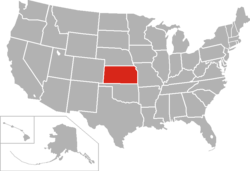Kansas Jayhawk Community College Conference
 | |
| Association | NJCAA |
|---|---|
| Commissioner | Bryce Roderick (since 2003) |
| Sports fielded |
|
| Region | VI |
| Official website | www |
| Locations | |
 | |
The Kansas Jayhawk Community College Conference is a college athletic conference that is a member of the National Junior College Athletic Association. As of 2007, the KJCCC was home to more than 3,000 student-athletes in the 19 men's and women's sports.
Members
Football
Only eight of the schools have football: Butler, Coffeyville, Dodge City, Fort Scott, Garden City, Hutchinson, Highland and Independence. The conference is not divided into divisions for football.[1]
From 2000 through the 2013 season, the regular-season champion was considered the Jayhawk Conference champion while the playoff champion was considered the Region VI champion. Prior to the 2014 season, the playoffs were eliminated from the schedule so that each Jayhawk Conference team could play a game versus each football-playing school in Iowa. The Jayhawk Conference regular-season champion is now also the Region VI champion.
Division I vs. Division II
KJCCC members can choose to compete in either NJCAA Division I or Division II in any sport (Except football, which does not have a Division II). All members compete in Division I in baseball but other sports are split.
The majority of schools are Division II in volleyball and softball. In these sports, the Western Division consists of the Division I schools while the Eastern Division consists of those choosing to play Division II. This results in an unbalanced alignment. This season (2010), KJCCC softball has 14 members playing softball in the Eastern Division and only 5 in the Western Division.
In men's and women's basketball, only Johnson County, Fort Scott, Kansas City Kansas, Labette and Highland currently play Division II. In the 2013-14 season, the four schools which were playing in Division II at the time (Labette did not change divisions until 2014-15), competed in a separate division ("East Division II"). Butler moved from the Western Division to the Eastern Division to help balance out the divisions. For 2014-15, the former division structure was restored with the Division I and II schools recombined in the Eastern Division and Butler going back to the Western Division.
Beginning in 2015-16, the basketball divisions were changed once again. All Division I schools were merged into a single division but did not play a full round-robin schedule. All Division II schools were also put into a single division, the same as in 2013-14.
Notable student-athletes
Olympics
- Veronica Campbell – won gold in the 200-meters and 4x100, and bronze in the 100-meters for Jamaica in 2004 Summer Olympics
- Derrick Brew – ran a leg on United States’s gold medal 4x400 relay in the 2004 Summer Olympics
Baseball
- Kelby Tomlinson - second baseman for the San Francisco Giants
- Trevor Rosenthal – relief pitcher for the St. Louis Cardinals
- Travis Hafner – designated hitter for the New York Yankees
- Adam LaRoche – first baseman for the Washington Nationals, and formerly the Atlanta Braves, Pittsburgh Pirates, Boston Red Sox and Arizona Diamondbacks.
- David Segui – former first baseman who played with seven teams over 15 Major League seasons; a career .291 hitter
- Junior Spivey – 2002 National League All-Star with Arizona Diamondbacks
- Kevin Young – former first baseman for the Kansas City Royals and Pittsburgh Pirates; hit 53 home runs over 1998 and 1999 seasons
Football
- Larry Brown – NFL running back, Washington Redskins; MVP in 1972
- Corey Dillon – former NFL running back, New England Patriots
- Kay-Jay Harris – NFL running back, New York Giants
- Brandon Jacobs – NFL running back, New York Giants
- Rudi Johnson – NFL running back, Detroit Lions, Cincinnati Bengals
- Steve Tasker – NFL special teams standout with Buffalo Bills; currently an analyst for CBS
- Devin Thomas – NFL wide receiver, New York Giants
- Shaun Hill – NFL quarterback, Minnesota Vikings
- Jason Pierre-Paul – NFL defensive lineman, New York Giants
- Jacquian Williams – NFL linebacker, New York Giants
- Nick Marshall - NCAA Quarterback, Auburn Tigers
